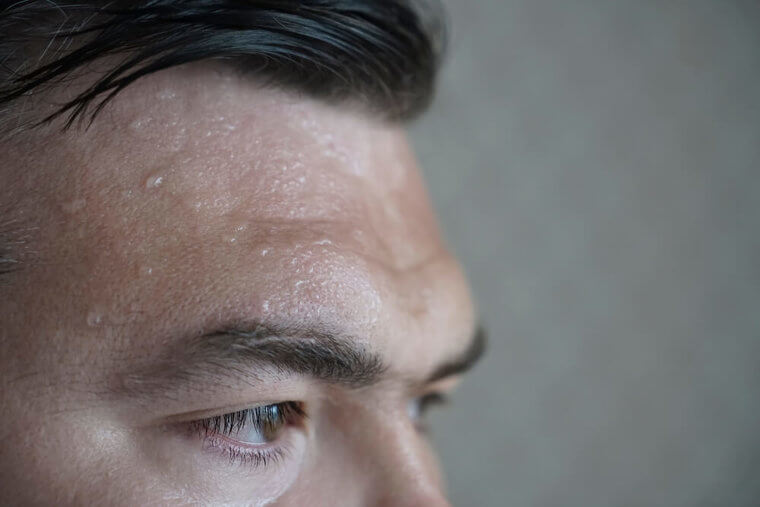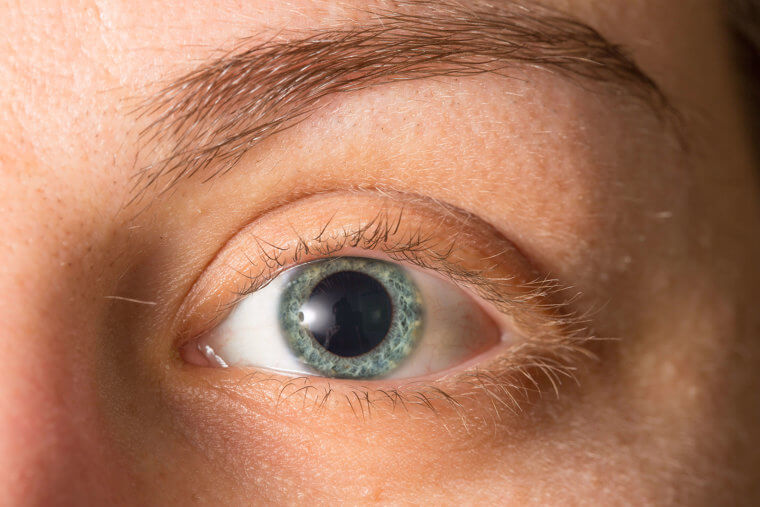This article was originally published on 24/7Mirror
They Scratch Their Faces
Besides the things people say when they are lying, there are also physical cues to look for. One example is when someone scratches their nose. A poker security expert said when someone tells a lie that they can't back up, blood rushes to their face, and it causes itching.
If you are playing poker with someone and they start to itch their face, it could be a tell-tale sign that they have a terrible hand. Unless they are itching their face while saying they have a bad hand because that would mean they are lying, and you should fold.
They Keep A Straight Face
Many nervous movements can give away a liar, but no movement can be a give away too. Body language experts have said that experienced liars learn to control their bodies, so they aren't too obvious.
If you want to spot a liar, look for the person that is too stiff and unanimated. People who are extremely skilled liars have learned how to naturally animate their bodies when they are lying so they won't look strange.
They Offer Many Details
You might think that people who are lying wouldn't want to give too much detail because they don't want you to ask a lot of questions. However, those who are not telling the truth usually share more than you asked for.
Liars embellish their stories to convince you that it actually happened. It is because they think that people will be more convinced if they are extremely specific. If someone is telling you an exact time, place, who was there, and mentions people that aren't relevant to the story, they are probably lying.
Defensive When Asked Extra Questions
Have you ever tried to challenge someone's story, and you were met with defensiveness? Liars often get offended when you try to verify details or tell them something about their story that doesn't sound right. They might say something like, "I can't believe you are questioning me," or "Why would I lie to you?"
These questions are an effort to throw the blame on you for questioning their integrity, and it diverts the conversation. They try to be innocent but remember that they are probably not being completely honest with you when they get defensive.
They Cross Their Arms
When someone is not truthful, they might try to close themselves off from other people by crossing their arms. People usually do this when they feel uncomfortable and want to distance themselves and others. It also makes them feel less exposed or vulnerable.
Some vulnerable parts of the body that liars try to cover are their kneecaps, bottom of the torso, or neck. They might try to put clothing over these parts or distance themselves by turning away or simply folding their arms.
They Make Too Much Eye Contact
While not making eye contact can be a giveaway that someone is lying, too much eye contact can also be a tell-tale sign. Experienced liars know that amateur fibbers won't look people in the eyes. Therefore, they try to do the complete opposite.
According to experts, it is harder to lie to someone when looking them in the eye, so they make more eye contact to seem normal. If you are talking to someone and they are looking you in the eye more than they usually would, they could be feeding you false information.
Your Gut Tells You They Aren't Being Honest
You have probably heard the saying, "trust your gut," and that is true when you are suspicious of a liar. Even if there aren't any obvious physical signs, your gut feeling might be stronger than anything you can see. Always trust your intuition.
Many people can pick up on subtleties without being aware of them. We can smell fear through preparation, and this is usually not a cue that we are paying attention to, so we tend to rationalize it and ignore our own intuition.
They Cover Their Mouth
Much like someone would itch their face if they are lying, they might also cover their mouth. It is a psychological tactic that makes them believe they aren't lying just because you can't see their mouth. Maybe they think if you can't see their lips moving, the words aren't coming from them.
People who are lying try to cover their mouths when something is untrue as a way to avoid confrontation. It's like they are closing off communication, so they don't share too much.
They Try Not To Make Eye Contact
One of the most common ways to spot a liar is that they refuse to make eye contact. You have probably seen a crime show where the police interrogate a suspect, and the person refuses to look the detective in the eye. That is a dead giveaway that they are hiding something.
Subconsciously, they think they can avoid being discovered by not making eye contact. However, don't rely on this alone because experts have figured out that it isn't the most reliable way to spot a liar, but that doesn't mean a person's eyes can't help you spot when someone is being untruthful.
They Start To Ramble
We mentioned before that liars will sometimes give too much detail, and they also have a tendency to ramble. They might digress from the original story or take a long time to get to their point.
If they have trouble answering a question quickly, something might be wrong. Many recruiters look for this during job interviews when candidates can't answer a simple question about their experience or something on their resume.
The Story Is Too Consistent
One might think that a liar would have trouble keeping track of their made-up story, but one sign of a liar is too much consistency. To anyone who picks up on it, it might sound like their answers are rehearsed, and they give the same lines over and over.
In interviews, the interviewer will sometimes ask a candidate why they are leaving their job at the beginning of an interview and circle back to the same question later in the meeting. If the person gives the same answer twice, the interviewer knows it's a lie because the response should never be identical.
They Are Over Confident
Having confidence is not always a bad thing. However, you have probably encountered someone who seemed a little too cocky, and something about them made you feel off. You can ask them anything, and no matter what the question is, they have a confident answer without hesitating.
For example, salespeople are great liars. The person may enthusiastically praise a product or service, and you have to figure out if they are too confident to be telling the truth. This is a challenging cue to spot, however, because some people are just naturally very confident.
They Become Distant
When people are honest and comfortable with what they are saying, they will be friendly and open to discuss the topic further. In comparison, someone who is fibbing might feel the need to be cold and distant because they don't want to reveal that they aren't telling the truth.
It is actually easier for people to lie to their friends and partners because they know how to act around them without seeming distant or withdrawn. This is why it might be hard to figure out if your friend is hiding something from you because they aren't acting differently.
They Look To The Right
The eyes are the window to the soul, so you can tell a lot about what a person is saying from their eyes. According to Calum Colburn, a global negotiations expert, if you think a person is lying, watch their eyes during a normal conversation. Their eye pattern will help you know when they are dishonest.
People usually look to the left when they are trying to recall something, and they look to the right when they are making things up. If you are ever trying to tell a white lie, be conscious of which direction your eyes are looking.
Giving Inconsistent Answers
While some liars memorize their answers word for word, others trip over their words as they know they are about to be caught. It usually happens when people are making things up on the fly, so their answers change from second to second.
When someone is trying to make things up as they go, they won't be able to keep track of what they told you. Therefore, there will be inconsistencies in their story. If you ask them a question and ask it again after some time has passed, you would probably get two different answers.
Their Actions Don't Match Up With Their Words
Nonverbal communication is essential when reading people. It can help you understand what people are really trying to say without their words, and it can help you pick out a liar. Most of the time, a dishonest person's actions won't match up with their words.
For example, customer service employees have fake smiles when you ask them questions, but internally, you know they are annoyed. It's easier to trust nonverbal signs rather than what people are actually telling you.
They Repeat Your Questions
When someone is lying, they often need more time to think of an answer to your questions. Because of this, they will try to buy time by repeating your question before answering. If a person does this more than once, they are probably having trouble thinking of honest answers.
You might ask, "Who were you with last night?" They will respond, "Who was I with last night? My friends." They might also compliment your questions before answering to stall even longer.
They Downplay Certain Details
If you have ever dealt with a cheater, you might know that they will downplay things all the time. It's a sign that there was more going on than they alluded to. A guy might say, "I was hanging out with my friends, and there was maybe one girl there. I wasn't paying attention."
It is important to listen for details in their story that they would normally talk about more but are being aloof about. If you press them for more details like we mentioned earlier, they might get annoyed, and then you will know they are definitely lying.
They Don't Actually Answer The Questions
When a person is telling the truth about something, they will answer simple, specific questions. However, when someone keeps avoiding the question and refuses to answer, you may find that they will give you a roundabout statement to avoid further questioning.
If you ask someone if they did something specific, and they respond with a stretched response that doesn't answer your initial question, it should raise some suspicions. In their minds, they aren't lying because they are avoiding the question altogether.
They Deflect Blame
Unless someone is a pathological liar, they probably have some shame around what they are lying about, so they will deflect responsibility. If someone does something wrong and they are willing to take the blame, they aren't lying.
However, when someone is not being honest, they will blame everyone else because they can't take responsibility for their actions. They might even turn the blame on you even if it couldn't possibly be your fault.
They Want You To Verify Details
Some liars will try to convince you that they are telling the truth by going out of their way to be transparent. They might even try to get you to verify the details of their story by saying things like, "Check the security footage," or "Look at my Facebook."
Although they say they want you to check the details of their story, they believe you won't do it because you think they are honest. If someone asks you to verify details, you should catch them in their lie.
They Try To Change The Subject
Even people who are experienced liars usually feel bad when they are dishonest. To make themselves feel better, they might try to change the subject entirely to avoid talking about their lie.
You could be asking them if they took money from you, and they will change the subject by complimenting your new hairstyle or asking if you lost weight. It might distract you for a few minutes, but you should rethink their credibility.
They Accuse You Of Lying
Have you ever had a conversation with a person and out of nowhere they try to accuse you of lying? If that has happened to you it might be because the other person was lying and wanted to shift the focus off of themselves.
By accusing you of lying, they are buying themselves time to think of a response and lead the conversation away from their lie. Skilled liars have been able to turn the whole conversation and make you think you are the crazy one.
They Fidget With Their Clothes
In a situation where someone is lying, they might fidget with their clothes by adjusting their tie or playing with the collar of their shirt. According to a former CIA officer, they do this to displace their anxiety.
In a situation that makes you nervous, you might find yourself playing with a bracelet or ring, and liars do the same thing because they fear they will be caught.
They Clear Their Throat Often
In the book "Spy The Lie," the former CIA officer says that liars clear their throats a lot and swallow before answering. That is a problem because they are doing the nonverbal equivalent of saying, "I swear..."
Clearing your throat could also mean that there is a spike in anxiety. That can cause dryness in the throat or discomfort in the mouth, which is why they are swallowing hard.
They Have Downcast Eyes
There are plenty of body language cues that could mean someone is lying, and one of those is when someone has downcast eyes. This usually is a sign when a child is lying because they will look at the ground instead of looking up at the adult.
This also happens when someone is upset, but they try to fake a smile and look down the second you look away. If someone is looking down at the ground, it is usually because they feel shameful, which can be a sign of a liar.
They Can't Stop Moving Their Leg
Sometimes people bounce and fidget their legs because they are restless. However, if you are talking to someone and they can't stop moving their legs, it could be a sign that they are lying.
People may cross and uncross their legs or tap their feet because they are nervous or anxious about the lie they told. It also might distract the person they are speaking to, which would take the attention away from the lie.
They Tilt Their Head To One Side
Liars will use their heads in odd ways. For example, they might try to make you believe their lie by shaking their head excessively when they speak.
If they remain silent and tilt their head down and to the side to avoid eye contact, they are probably trying to think of a believable answer. That is when you know something isn't right, and you should be suspicious.
They Hold Their Hands Behind Their Back
Out of all the body language indicators to spot a liar, this one is the most open to interpretation. People hold their hands behind their backs for many reasons, and it doesn't always mean they are lying, but it can.
Some people are taught to do this as a sign of respect. However, when it comes to lying, it is usually coupled with other indicators. For example, people might put their hands behind their backs when they lie as a way to stop themselves from fidgeting.
They Start To Sweat A Lot
When people are lying, they might start to sweat because they are nervous. Therefore, it is important to look at their temples, around their lips, and their underarm areas to see if they are sweating.
While it is important to consider the temperature because people sweat for many reasons, but if it is not warm, they will probably start sweating from their hairline first. Nervous sweat also has a bad smell.
Their Pupils Dilate
If you have trouble identifying nonverbal signs of a liar, looking at someone's eyes can help you determine if they are dishonest. While it might be hard to look deep into someone's eyes, there is one crucial thing to look for.
A person who is lying will have dilated pupils because lying makes us nervous. That results in increased heart rate and pupil dilation. It might be hard to tell with dark eyes, but it is important to try and detect this.
They Try To Make Jokes
Some people who are lying will try to divert attention from their lies will try to make others laugh. This disarms you and makes the conversation less serious, relaxing you and making you forget about their lies.
If you are laughing, you are probably not thinking about how someone is deceiving you. It makes sense because you are calm and having a good time. We wouldn't be thinking about a lie if we were laughing.
They Bite Their Lip
Lying never feels good, so when someone does it, they feel self-conscious about their mouth. In addition, they will likely feel nervous, and those emotions cause them to start biting their lower lip.
Look for this behavior because it could mean that they are lying to you. For example, they might chew on their lip while talking or asking questions. They might also do the same thing when answering questions because it takes longer to think of answers.
They Fake A Smile
There are many reasons why people put on a fake smile, and one of the reasons could be that they are lying. For example, a liar might press their lips together in a tight smile that doesn't reach their eyes to hide real facial expressions.
It is easy to spot a real smile because their eyes crinkle. Liars might fake a smile to make it seem like they aren't nervous or trying to hide something.
They Might Blink A Lot
Many studies have shown that eye contact has nothing to do with truthfulness. However, that doesn't mean a person's eyes can't help you figure out if they are being dishonest.
When someone is lying, they might start blinking rapidly as another way to avoid eye contact. For example, if you ask a person a question and they start blinking rapidly, they might be lying to you,
They Flare Their Nostrils
Flared nostrils are a micro-expression that might indicate a person is lying. This can happen because a person feels defensive; since they are nervous, you will catch them in a lie. Therefore, it's important to watch their nose when they speak.
Try asking them questions such as, "can you tell me again what happened?" Or "if you didn't do it, who did?" Then observe their nose to see if their nostrils are moving, which would indicate they are lying.
They Put Their Hands In Their Pockets
As we mentioned before, a person who is lying will likely have trouble keeping their hands still or making normal hand gestures. In some cases, they may want to hide their hands in their pockets, so people don't pick up on that.
It is important to observe their hand movements and notice if they put their hands in their pockets or place their hands behind their backs. You might also notice the person touching random objects or wringing their hands.
Notice If Their Sentence Structure Changes
When someone tells a lie enough times, they start to get more comfortable with their story. If you hear this story multiple times, you may notice that the liar uses sentence fragments when they make things up and more complex run-on sentences when they really want you to believe something.
It is important to pay attention if the person suddenly switches between short, incomplete sentences and long, complex sentences. While it might be hard always to spot these changes, it can be another way to call out a liar.
Listen To See If Their Voice Gets Higher
We have seen many situations in movies and TV shows where one of the characters is lying, and another character calls them out because their voice got high and squeaky when they started to be dishonest. This happens when your body tenses up.
When a person gets tense, this can affect the tone of their voice, causing it to go up or down. Therefore, you can consider any change in the tone of their voice as an indication that they are lying.
They Have A Surprised Expression
Have you ever caught someone in a lie, and they look completely shocked and try to twist the blame onto someone else? The look of surprise usually comes with denial and them asking, "why would I lie to you?"
Although lying is not funny, it is almost comical how they are surprised that you figured out they were lying. As if they are the best liars in the world, but they gave it away with other indicators.








































